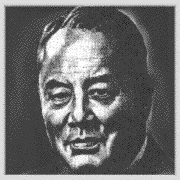 Robert
Kho-Seng Lim was born on October 15, 1897 in
Singapore, as such he was a British subject of Chinese parentage. Lim
studied in Scotland and served during World War I in the Indian Army
Medical Service. He earned his M.A. (1919), Ph.D. (1920) and D.Sc.
(1924) degrees from Edinburgh University in Scotland. He began his
professional career as a lecturer at Edinburgh University. He
traveled to the United States of America as a Rockefeller Fellow and
was associated with the University of Chicago. He became a professor
of physiology at Peking Union Medical College in 1924. During World
War II Lim was called to organize the Chinese Red Cross Medical
Relief Corps.
Robert
Kho-Seng Lim was born on October 15, 1897 in
Singapore, as such he was a British subject of Chinese parentage. Lim
studied in Scotland and served during World War I in the Indian Army
Medical Service. He earned his M.A. (1919), Ph.D. (1920) and D.Sc.
(1924) degrees from Edinburgh University in Scotland. He began his
professional career as a lecturer at Edinburgh University. He
traveled to the United States of America as a Rockefeller Fellow and
was associated with the University of Chicago. He became a professor
of physiology at Peking Union Medical College in 1924. During World
War II Lim was called to organize the Chinese Red Cross Medical
Relief Corps.
From his military experience in World Wars I and II he became interested in pain-relieving drugs. He discovered that pain receptors are chemo-sensitive, that pain-producing agents such as bradykinin peptides are produced when tissues of the body are injured. Additionally, he discovered that aspirin and other analgesic drugs relieve pain by combining with the pain-provoking chemicals (bradykinin peptides) and altering their function.
Lim also investigated the production of gastric secretions and vagal stimulation during his career. he and his coworkers demonstrated that gastric secretion could be stimulated locally by mechanical means. He also showed that sympathetic reflexes could be evoked by stimulation of the medulla of the brain. Following World War II, Lim established ten hospitals in China before leaving to accept a position with Miles Laboratories in the United States of American.
He was elected a member of the Deutsche Akademie der Naturforscher (1932), the United States National Academy of Sciences (1942), the American Gastroenterological Association (1946), and the American College of Surgeons (1947). He died on July 8, 1969 in Elkhart, Indiana at the age of 72.
References
McGraw-Hill (1966). McGraw-Hill Modern Men of Science. New York: McGraw-Hill.